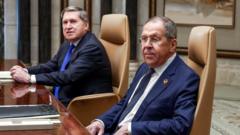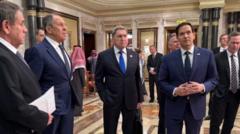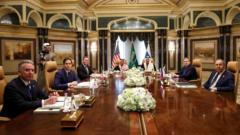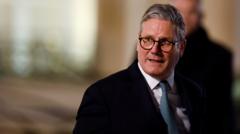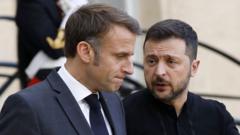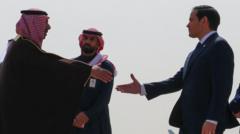JD Vance's speech at the Munich Security Conference turned heads as he criticized European allies while glossing over pressing matters regarding Ukraine and defense spending.
### Vance's Controversial Munich Speech Diverts Focus from Key Issues
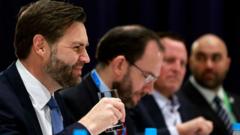
### Vance's Controversial Munich Speech Diverts Focus from Key Issues
**Vice President's Remarks Spark Debate on U.S. and European Relations**
**Vance's contentious address, which veered off-topic, raised questions about U.S. foreign policy and drew criticism from European leaders.**
In an unexpected twist at the Munich Security Conference (MSC), U.S. Vice President JD Vance took to the podium not to engage with the pressing issues facing Europe and Ukraine, as many expected, but instead delivered a stinging critique of Washington's allies. Delegates anticipated discussions focused on navigating the conflict in Ukraine and enhancing European defense spending, yet Vance's 20-minute address was anything but typical.
His comments about misinformation, disinformation, and the state of free speech in Europe were met with a notable silence from the audience. Even a humorous attempt at lightening the mood, referencing climate activist Greta Thunberg and Elon Musk, fell flat. The vice president accused European governments of abandoning their core values and failing to address voter concerns on important issues such as migration and free speech. His remarks were described as poorly timed and unfocused, raising eyebrows among political analysts.
Critics suggested that the speech was more directed at a domestic American audience than at the European delegates present, aiming to solidify Vance's image back home. Following his controversial address, he did meet with Ukrainian President Volodymyr Zelensky, where both leaders discussed the necessity of collaboration on security guarantees and strategies to counter Russia's aggression.
While President Zelensky tried to frame the meeting positively, noting it as the beginning of ongoing discussions, concerns loomed over recent statements from former President Donald Trump. Trump signaled a shift in the U.S. narrative regarding Ukraine, suggesting that the restoration of the nation's pre-2014 borders was "not realistic," a sentiment echoed by his Defense Secretary. This indicates an alarming pivot away from prior commitments, raising fears in Europe that peace negotiations may ultimately favor Moscow.
The backdrop of Vance's speech also included a surprising phone call between Trump and Russian President Vladimir Putin, which broke a longstanding diplomatic freeze and left European leaders wary of the implications for Ukraine. As the conference unfolded, delegates prepared for deeper conversations around the ongoing conflict and potential resolutions, amidst trepidations regarding U.S. intentions under a potential future Trump administration.
The Munich Security Conference thus highlighted the fragile state of transatlantic relations, with Vance’s remarks serving as a focal point for ongoing discussions about free speech, government accountability, and the role of the U.S. in supporting European allies against Russian encroachment.
In an unexpected twist at the Munich Security Conference (MSC), U.S. Vice President JD Vance took to the podium not to engage with the pressing issues facing Europe and Ukraine, as many expected, but instead delivered a stinging critique of Washington's allies. Delegates anticipated discussions focused on navigating the conflict in Ukraine and enhancing European defense spending, yet Vance's 20-minute address was anything but typical.
His comments about misinformation, disinformation, and the state of free speech in Europe were met with a notable silence from the audience. Even a humorous attempt at lightening the mood, referencing climate activist Greta Thunberg and Elon Musk, fell flat. The vice president accused European governments of abandoning their core values and failing to address voter concerns on important issues such as migration and free speech. His remarks were described as poorly timed and unfocused, raising eyebrows among political analysts.
Critics suggested that the speech was more directed at a domestic American audience than at the European delegates present, aiming to solidify Vance's image back home. Following his controversial address, he did meet with Ukrainian President Volodymyr Zelensky, where both leaders discussed the necessity of collaboration on security guarantees and strategies to counter Russia's aggression.
While President Zelensky tried to frame the meeting positively, noting it as the beginning of ongoing discussions, concerns loomed over recent statements from former President Donald Trump. Trump signaled a shift in the U.S. narrative regarding Ukraine, suggesting that the restoration of the nation's pre-2014 borders was "not realistic," a sentiment echoed by his Defense Secretary. This indicates an alarming pivot away from prior commitments, raising fears in Europe that peace negotiations may ultimately favor Moscow.
The backdrop of Vance's speech also included a surprising phone call between Trump and Russian President Vladimir Putin, which broke a longstanding diplomatic freeze and left European leaders wary of the implications for Ukraine. As the conference unfolded, delegates prepared for deeper conversations around the ongoing conflict and potential resolutions, amidst trepidations regarding U.S. intentions under a potential future Trump administration.
The Munich Security Conference thus highlighted the fragile state of transatlantic relations, with Vance’s remarks serving as a focal point for ongoing discussions about free speech, government accountability, and the role of the U.S. in supporting European allies against Russian encroachment.






